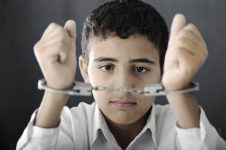Should Prison be a Last Resort for Children?

In yet another devastating blow to Australia’s human rights obligations, the president of the Queensland Children’s Court, Judge Michael Shanahan, has warned that the government is breaching the United Nations Convention on the Rights of the Child by imposing lengthy prison sentences on juveniles with no right to appeal.
Judge Shanahan recently published his annual report, claiming that the Newman government was no longer treating detention as a last resort for juvenile offenders.
The Newman government has come under fire from Judge Shanahan in recent years for its handling of young offenders.
Australia is a signatory to the United Nations Convention on the Rights of the Child, which states that imprisonment and the deprivation of liberty should only be used as a last resort.
However, earlier this year, Queensland reformed the law in relation to children, removing the principle that detention should only be used as a last resort.
The new laws also allowed 17 year-olds to be transferred to adult prisons, and for youth in Townsville to undertake a compulsory ‘boot camp’ where they commit multiple motor vehicle offences.
This also contravenes the UN Convention on the Rights of the Child, which says that the prison system should treat children separately from adults.
Queensland is the only Australian state that deals with juveniles in this manner.
Judge Shanahan says that these reforms do not reflect the law in other states and territories, and are incompatible with our international obligations.
He considers the laws to be of ‘grave concern.’
There are fears that the laws will result in an increased number of children being sent to prison.
Numerous studies have shown that prison is an ineffective way of dealing with young people as it provides little by way of rehabilitation whilst exposes them to ‘hardened’ criminals, and teaching them new criminal skills. It thereby increases the likelihood of reoffending rather than promoting social reintegration.
Prison also comes at a high cost to taxpayers, with some studies showing that it can cost up to $100,000 to house a single prisoner for a year.
Which begs the question – why have these laws been introduced?
In an equally concerning move, the Queensland government has made it more difficult for children to appeal their sentences.
The changes were brought in under the advice of then Chief Magistrate Tim Carmody, who has since been shunned by his colleagues on the bench for his support of the government’s controversial anti-bikie laws.
Judge Shanahan says that he was never consulted about the new reforms before they were brought in.
Carmody has defended the laws, saying that by making it more difficult for children to appeal their sentences, courts have the time to concentrate on more serious matters.
But research has shown that the time actually spent reviewing juvenile sentences is minimal.
Opponents of the new laws argue that the right of children to appeal unjust sentences is of paramount importance.
They are concerned about the fact that the number of juvenile sentence appeals has dropped substantially since the introduction of the laws.
Judge Shanahan says that this raises concerns about the number of young people unable to appeal unjust and inappropriate sentences.
Shanahan has also criticised the government’s decision to introduce a ‘naming and shaming’ system for juvenile offenders.
The measure allows media organisations to identify young offenders by name, no matter what the offence was.
Many have raised concerns that this will have a permanent and detrimental impact on young persons’ lives, stigmatising them whilst making it harder to secure employment or pursue future goals.
Similar measures have been used in the Northern Territory and United Kingdom, but have since been abandoned on the basis that they were ineffective.
Despite these concerns, the Queensland government does not have any plans to change the laws in the near future.
The Attorney-General, Jarrod Bleijie, has voiced his support for the measures, saying that they have resulted in a fall in juvenile crime.






